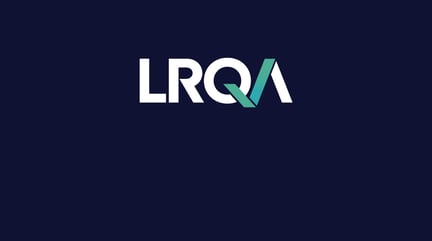As businesses navigate an increasingly complex and competitive global environment, the focus of modern quality management has evolved beyond compliance to become a driver of performance and strategic success.
In line with the theme for World Quality Week 2024, From compliance to performance, this article explores how quality management system standards, such as ISO 9001, play a pivotal role in transforming organisations from simply meeting regulatory requirements to achieving long-term business success.
Here, Martin Cottam, Chair of the ISO Technical Committee for Occupational Health and Safety and former Quality Director at LRQA, along with Carl Rogers, Global Head of Quality and Governance at LRQA and Anshuman Tiwari, Global Head of Operational Excellence at DXC Technology, share their insights on how quality certification is crucial in this shift.
Certification: compliance or performance?
Critics of certification sometimes argue that it promotes a compliance mentality in organisations, fostering a tick-box approach rather than encouraging genuine engagement. However, as Martin Cottam—Chair of the ISO Technical Committee for Occupational Health and Safety and former Quality Director at LRQA—explains, "a closer reading of the standards shows that they are not just about compliance; they are firmly focused on performance, with a clear requirement that organisations ensure that their processes are effective." Certification, when done effectively, addresses this requirement by challenging organisations to "demonstrate that their processes are delivering the intended outcomes," pushing them beyond compliance towards achieving real performance improvements. He emphasises that the goal is not just to meet minimum requirements but to continually enhance processes in line with the organisation's performance objectives.
Cottam further points out that the key challenge for organisations is to "achieve intended outcomes in a constantly changing world." This challenge is directly addressed by connecting organisational processes through a management system framework which monitors and responds to evolving risks and opportunities such as "geopolitical impacts on global supply chains, the effects of climate change, the rise of AI and new technologies and shifting workforce demographics." He stresses that organisations must adjust their performance targets as external conditions and expectations evolve, ensuring they remain competitive and relevant in a dynamic environment.
The foundation of business excellence
At LRQA, our focus on quality extends beyond compliance, working closely with clients to help them establish strong foundations for growth through robust quality management systems (QMS). In a recent podcast, we discussed this with Anshuman Tiwari, Global Head of Operational Excellence at DXC Technology, a long-standing client of LRQA. Tiwari shared his perspective on how effective management systems can drive business performance.
According to Tiwari, the journey to business excellence starts with the mindset that "anything being done can be done better." This belief is central to the field of quality, which is fundamentally about continuous improvement. He explained that management system standards like ISO 9001 are crucial in this journey, as they provide a framework for organisations to document, measure and enhance their processes. The principle of "document what you do and do what you document" is at the heart of ISO 9001, ensuring not only consistency and accountability but also the ongoing improvement necessary for long-term business success.
From compliance to performance
Echoing these sentiments, Carl Rogers, Global Head of Quality and Governance at LRQA states “while compliance with standards is necessary, quality management systems are not just about ticking boxes”, emphasising that "quality is the foundation for future business growth and success." Compliance should be seen as the starting point, not the destination. The true value of management systems lies in their ability to go beyond compliance and drive performance improvements across the organisation.
By embedding quality into the fabric of their business, organisations can not only meet regulatory requirements but also create a culture of continuous improvement that enhances performance.
Looking ahead
The ability to adapt to changing global conditions—such as advancements in technology, environmental concerns and competitive pressures—is essential. Management systems provide a framework that enables organisations to focus on growth in an environment with increasingly complex risks.
By making quality a strategic priority, businesses can achieve greater efficiency, ensure their sustainability, and ultimately deliver more value to their customers.
Find out how LRQA can help you address quality challenges in your organisation
ISO 9001All certification services









